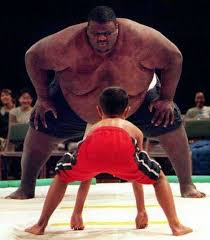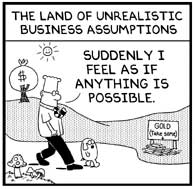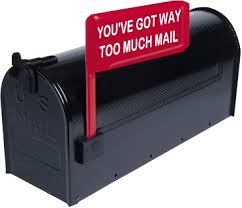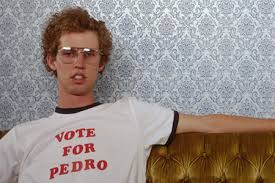A Biggie Can't Be Small
admin, April 19, 2012
Remember the movie, Hoosiers? Remember the movie, Rocky? Remember the movie, The Revenge of the Nerds? Remember Napoleon Dynamite? Well, perhaps you're seeing the pattern here. People are emotionally tied to the underdog, the small-time outfit, those who show character in the face of bigger competitors. We often embrace the smaller entities. Why? Maybe because the success of the biggie, the popular, is pretty typical; we've seen 'that one.'
I read a good post this morning by Dr. Pete at SEOmoz, chronicling the 'breaks' of bigger brands. In some regards, the breaks of the 'biggies' seem unfair. They have more money for advertising, for outbidding for talent, for underselling competitors, and so on.

However, smaller brands have the luxury of less expectation, less anxiety to 'live up to a name,' and going at a patient pace, amongst others. Is your brand of the 'smalls' variety? Does your present station bother you? Why? Maybe you need to revisit some of the films above.
Scaling
Have you ever gone on a diet? I'm lucky enough to be the same waist size as myself in my young twenties (must be all that reading). Have you ever witnessed someone on a crash diet? I have; most bite off more than they can chew, creating a very unrealistic weight and time limit. Are they building their project to an appropriate scale? No.

Small-waist brands don't have to chase the rotund shape of bigger brands in respective verticals. If yours is a brand, so closely related to another, I think scaling is a secondary issue anyway. For those just starting, scaling to realistic proportions is an advantage you have over the bigger brands that often get caught up in the game of investors and popular-kid expectations. Most big brands already passed the point of no return, where it's 'do or die,' 'post numbers or shut down.' A smaller brand has the luxury of patiently rising at the pace of its own 'genetics.'
Consumer Connection
Maybe you've heard, social is a huge modern-day aspect of marketing. 'Social' means a lot of things; but, basically it means a brand can directly relate to its consumers. Let's consider the dynamic for 'biggies' and 'smalls' brands.
Let's say I have a Facebook issue. Let's say it’s a genuine issue, of the un-fanboy variety; I really want to get a genuine answer from Zuckerberg, the brand's owner. As a consumer, I really don't think this is a mind-blowing request. However, Facebook has 800 million (or something like that) users. That's awesome for Zuck; I get it; he can buy and sell me millions of times over; he doesn't need to respond to me; chances are my question won't even reach him.

Let's consider another owner who makes himself more readily available to his consumers. I can (and do) directly email them with concerns, suggestions, questions about their brand, etc. As a consumer, I deeply value that; I really do. I'm likely to never forget that level of service. I'm no Google search engine; but, if someone treats me well, and someone asks me about my experience with a particular product or service, you can bet your bottom dollar I'm going to suggest those who treat me well. That's a level of engagement, which is difficult or near impossible for 'biggies' to achieve. I vote for 'Pedro,' and not the only one.

I spent some time thinking about another cohort's question on Dr. Pete's post. John is inquiring about how a smaller brand can really compete with a bigger brand. I addressed his question in the comments; I also want you to read it too because I can't over-emphasize the real power of branding; it transcends rank; it gets consumers to come straight to you, with no need to search for your brand's offerings. Guess what? I also think it' much easier for a smaller brand to effectively and consistently brand.





